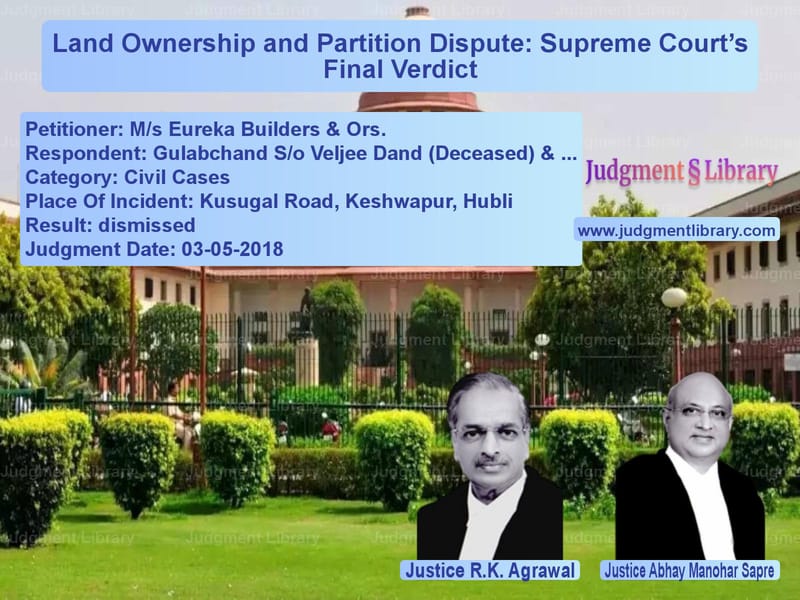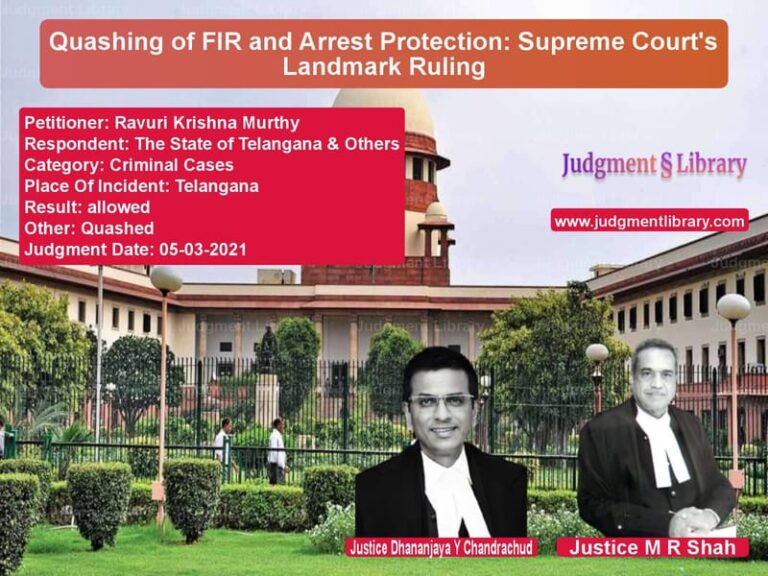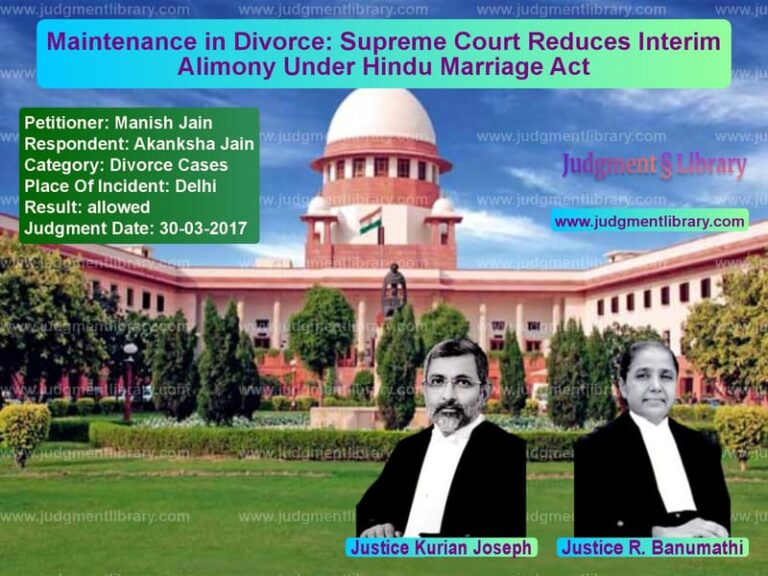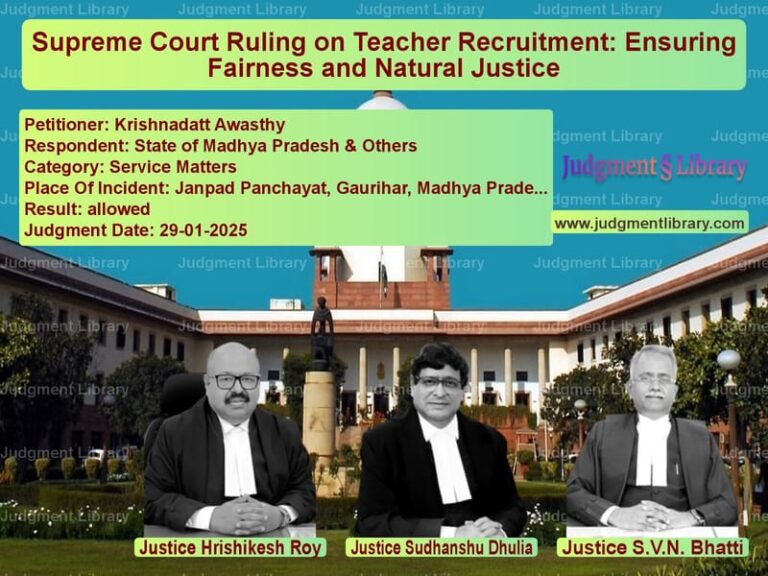Land Ownership and Partition Dispute: Supreme Court’s Final Verdict
The Supreme Court of India, on May 3, 2018, delivered a significant ruling in M/s Eureka Builders & Ors. vs. Gulabchand S/o Veljee Dand (Deceased) & Ors., resolving a decades-long land ownership and partition dispute. This case involved a contested property situated at Kusugal Road, Keshwapur, Hubli, and sought to determine rightful ownership, inheritance claims, and the validity of prior transactions.
The judgment provided final clarity on whether the property legally belonged to the successors of Shah Veljee Kanjee or whether the original holders (three PATIL) retained ownership rights due to a re-grant order issued by the State.
Background of the Case
The dispute revolved around land bearing CTS Nos. 361 and 366, originally owned by three persons—Marigouda Patil, Basangouda Patil, and Adveppagouda Patil (collectively referred to as ‘three PATIL’). Over the years, multiple transactions and litigations occurred regarding the ownership of this land.
Initially, in 1915 and 1920, parts of the land were leased out to different individuals, and in 1942, one portion was sold through Court Auction to Shah Veljee Kanjee. The second portion was purchased directly by him in 1943. Upon his death in 1957, his legal heirs inherited the property.
However, in 1957, Kanjee’s widow and two daughters sold the land to the Gadag Co-operative Cotton Sales Society Ltd., which was later challenged in a suit (O.S. No.9/1969) by Kanjee’s son and other heirs. This litigation culminated in 1977 when the court declared the sale illegal and ruled in favor of the plaintiff’s share.
Legal Questions Considered
- Was the plaintiff entitled to a share in the land despite the sale to the Society?
- Did the re-grant order of 1973 issued in favor of the original holders (three PATIL) nullify prior ownership claims?
- Was the suit filed by the plaintiff legally maintainable given the historical transactions?
- Did the limitation period under the Limitation Act affect the claims of the original holders?
Petitioner’s Arguments
The appellants (M/s Eureka Builders & Ors.) contended that they had legally acquired the land from the original holders (three PATIL), who regained ownership through a re-grant order in 1973. They argued:
- The original holders’ ownership was reinstated by the State’s re-grant order, making their subsequent sale valid.
- The legal heirs of Shah Veljee Kanjee had lost their rights as the property was never formally re-transferred to them.
- The plaintiffs had no legal standing to claim partition or ownership rights over the suit land.
Respondent’s Arguments
The plaintiff (Gulabchand, legal heir of Shah Veljee Kanjee) argued:
- The family had continuously possessed and used the land since 1942/43.
- The sale of the land in 1957 was declared void by the courts in 1977 and upheld in subsequent appeals.
- The re-grant order of 1973 did not supersede their legal title, as no ownership rights were revoked by the State.
- The original holders (three PATIL) had abandoned their rights by failing to claim the land within the legally prescribed period.
Supreme Court’s Observations
The Supreme Court examined all historical transactions, prior judgments, and the impact of the re-grant order. The Court ruled:
“A right in property, once extinguished by operation of law, cannot be revived unless the law itself provides for its revival in a particular situation.”
The Court further observed:
“Once the ownership rights were settled in 1977 in favor of the plaintiff and his family, the subsequent re-grant order in 1973 could not retroactively impact their legal status.”
Final Judgment
The Supreme Court ruled in favor of the plaintiff, stating:
“The plaintiff is the rightful owner of the land and is entitled to claim his 1/5th share along with other legal heirs of Shah Veljee Kanjee. The sale by the original holders (three PATIL) to the appellants (M/s Eureka Builders) is illegal and void.”
The appeals were dismissed, upholding the High Court’s decision that recognized the plaintiff’s ownership rights.
Key Takeaways from the Judgment
- Ownership of land was firmly established in favor of the plaintiff and his legal heirs.
- The re-grant order of 1973 did not have the power to override past legally settled claims.
- The original holders (three PATIL) lost their rights due to their inaction over decades.
- Future claims based on the re-grant order would not be entertained.
This ruling ensures finality in the ownership dispute and reinforces the principle that land rights, once adjudicated, cannot be undone by subsequent administrative orders.
Petitioner Name: M/s Eureka Builders & Ors..Respondent Name: Gulabchand S/o Veljee Dand (Deceased) & Ors..Judgment By: Justice R.K. Agrawal, Justice Abhay Manohar Sapre.Place Of Incident: Kusugal Road, Keshwapur, Hubli.Judgment Date: 03-05-2018.
Don’t miss out on the full details! Download the complete judgment in PDF format below and gain valuable insights instantly!
Download Judgment: Ms Eureka Builders vs Gulabchand So Velje Supreme Court of India Judgment Dated 03-05-2018.pdf
Direct Downlaod Judgment: Direct downlaod this Judgment
See all petitions in Property Disputes
See all petitions in Landlord-Tenant Disputes
See all petitions in Succession and Wills
See all petitions in Judgment by R K Agrawal
See all petitions in Judgment by Abhay Manohar Sapre
See all petitions in dismissed
See all petitions in supreme court of India judgments May 2018
See all petitions in 2018 judgments
See all posts in Civil Cases Category
See all allowed petitions in Civil Cases Category
See all Dismissed petitions in Civil Cases Category
See all partially allowed petitions in Civil Cases Category







